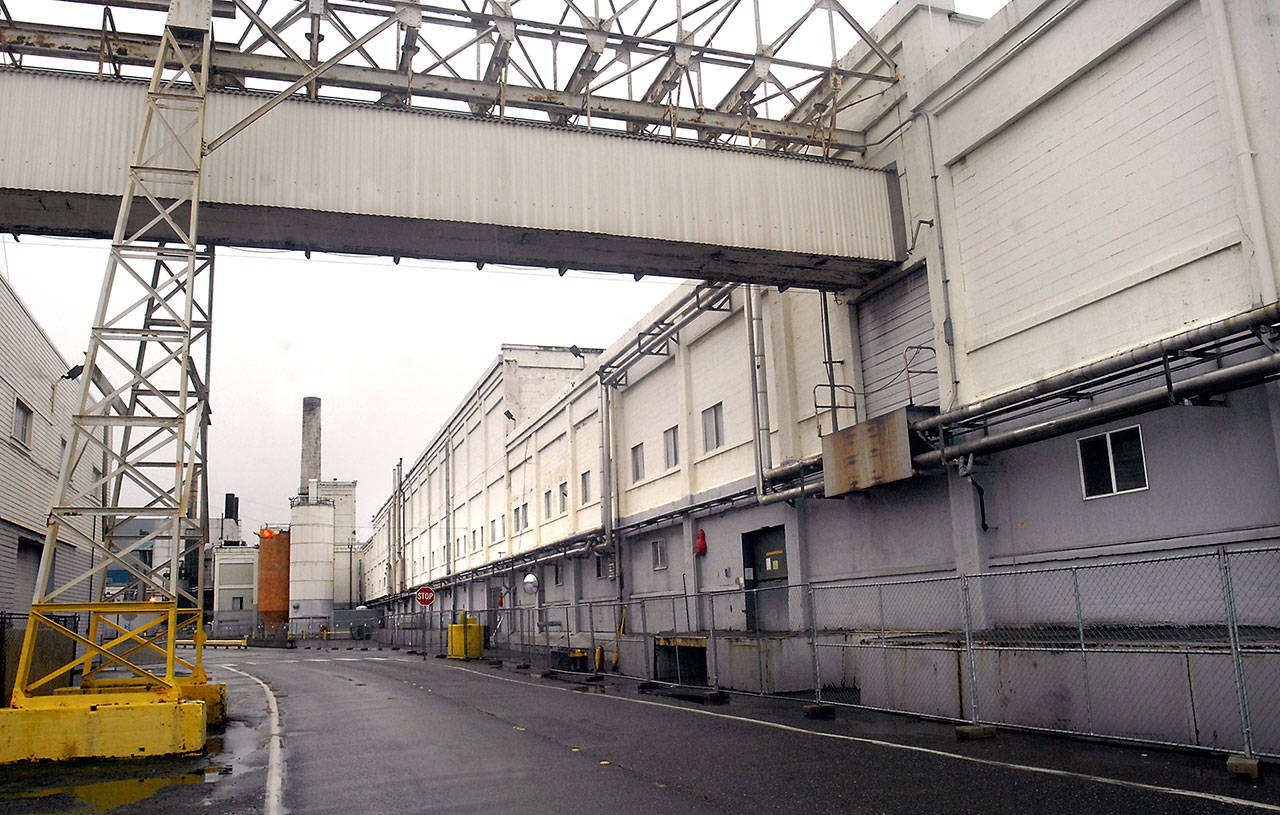PORT ANGELES — McKinley Paper Co. has selected a vendor for equipment that will produce cardboard liner at the former Nippon Paper Industries USA papermaking plant on Ediz Hook, a company official said Tuesday.
But Human Resources Manager Cathy Price, a spokeswoman for the Mexican-owned company, said no equipment has been ordered for retooling the plant, which she said employs 25 workers to keep the plant maintained while it’s not manufacturing.
“We are on hold,” Price said.
She said that while December 2018 remains a “target” for starting up the factory in its new form, there is no date certain for flipping the switch.
“We do not have a startup date.”
“[December] is still the target, but that could change.
“I can’t even commit to a month.
“It’s a project that is influenced by many factors, and we will get there when we get there.”
The name of the equipment vendor was not available Tuesday.
The next stages include a pre-engineering process to retool the plant.
Contracts will be signed, parts ordered and new equipment installed, Price said.
The plant has two paper machines, but just one was churning out product around the time that McKinley bought Nippon for $20.6 million in a sale that was finalized March 31.
The Japanese-owned company produced newsprint and telephone book paper when markets were relentlessly declining for both.
Price said that McKinley will continue using at least one of the machines but had not yet decided to use the other one, too.
Nippon had employed more than 150 workers before slowly laying off employees and finally ceasing production by the time McKinley, owned by Mexican paper-making giant Bio-PAPPEL, purchased the plant.
Those still working there as of Tuesday included 20 factory workers, 14 of whom are members of Western Pulp and Paper Workers Local 153, Price said.
McKinley, which also operates a plant in Pruitt, N.M., inherited Nippon’s contract with the union, a connection that will continue when the plant starts up again, Price said.
“The people that we hire, whether they are former employees or not, will be union represented because the labor contract is a legal document,” she said.
“So that part has not and will not change.”
Interim Port Angeles Finance Director Tess Agesson said Tuesday the continued plant shutdown will cost the city an estimated $440,000 in electrical utility tax revenues in 2018 the city had expected to realize if the plant were full-bore up and running.
She said the shortfall will be covered by $373,500 in budget savings and $66,500 in reserves.
Agesson said city officials also don’t know when the plant will start up, or how the electric-utility revenue shortfall created by a dormant plant will be covered in 2019 if McKinley does not begin operations by December 2018.
Even when McKinley does start up, it’s unknown how much power the company will consume.
McKinley uses recycled cardboard for its cardboard liner.
“They are doing some cost savings and energy savings as well,” Agesson said.
“We will have a new normal.
“We just don’t know what that is.”
By March or April, city officials will begin budgeting for 2019 and the first half of 2020, Agesson said.
“By the end of the first quarter or beginning of the second quarter [of 2018], hopefully we’ll have some determination on when they are going to be gearing up and what kind of power consumption they will have, and that will allow us to plan for 2019,” she said.
“We are actively planning for all contingencies.”
With the mill shut down, the state Department of Ecology issued a revised permit Oct. 27 allowing McKinley to reduce the monitoring regimen for treated wastewater that the company is responsible for that flows into the Strait of Juan de Fuca, company Environmental Manager Paul Perlwitz said Tuesday.
The mill’s wastewater treatment plant processes rainwater as well as water discharged from the mill’s cooling operations.
“What our focus is on is to preserve the assets and maintain them,” Perlwitz said.
“Foremost is fire protection and keeping the roofs intact to keep the building dry, maintaining the electrical systems and continuing to deal with local agencies on plant inspections and things like that,” he said.
“There is plenty of work to do for the small crew that’s here now.”
Perlwitz said employees staffing the plant are looking toward the future, when the workforce builds up again and new training is needed to run new product-processing areas.
“Those details we want to get right, to train people to get the best quality we can,” he said.
“From the outside it does not look like a big change, but from the inside, when you are doing it on a 24-hour basis, it will get attention to detail and [mean] learning new techniques, but it can all be done.
“We are very hopeful.”
________
Senior Staff Writer Paul Gottlieb can be reached at 360-452-2345, ext. 55650, or at pgottlieb@peninsuladailynews.com.

